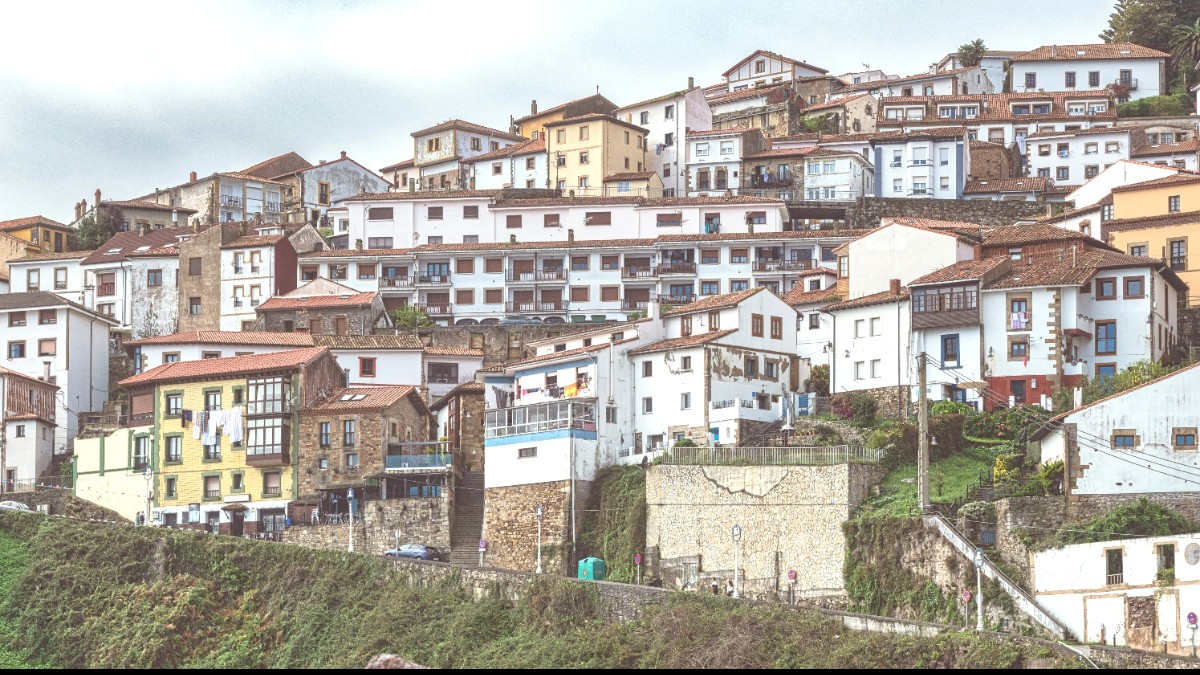
Asturias, Spain
The climate brings mild temperatures year-round and consistent rainfall, which gives Asturias its characteristic lush green scenery. Rivers like the Nalón and the Nora flow through the region, contributing to the fertile valleys and agricultural traditions.
Oviedo's "green" reputation comes from its frequent rainfall. While extreme temperatures are rare, prepare for changeable weather even in summer. Carry a light waterproof layer, as a sudden shower can occur at any time. Coastal fogs are possible, specifically near the sea, which can sometimes extend inland.
The shoulders seasons (May-June, September-October) offer comfortable temperatures and fewer crowds for city walks and museum visits. For hiking and outdoor activities in natural parks, late spring and early autumn provide ideal conditions. Plan your trip for September to experience the San Mateo Fiestas. Cider tasting is a year-round activity, notably enjoyable in warmer months when sidrerías open their outdoor terraces.
This proximity to both mountains and coast means that within a short drive from Oviedo, you can transition from an urban setting to high-altitude hiking trails or sun-drenched beaches.
(July-August)
Warmest weather, longest daylight. Most events and festivals are active. Attractions operate on extended schedules.
Higher prices for accommodation and flights. Popular sites are busy. Booking well in advance is highly recommended.
(May-June, September-October)
Pleasant temperatures, fewer crowds than summer. Lower prices. Lush green landscapes, ideal for outdoor activities.
Increased rain chances. Some coastal activities might wind down by late September.
(November-April)
Lowest prices for accommodation and flights. Few tourists mean authentic local experiences. Cozy atmosphere for indoor activities and hearty food.
Colder temperatures prevail. Higher chance of rain. Daylight hours shorten. Some smaller attractions might have reduced hours.
Oviedo's "green" reputation comes from its frequent rainfall. While extreme temperatures are rare, prepare for changeable weather even in summer. Carry a light waterproof layer, as a sudden shower can occur at any time.
Coastal fogs are possible, specifically near the sea, which can sometimes extend inland.
Shoulder seasons (May-June, September-October).
Late spring (May-June) and early autumn (September-early October).
September for the San Mateo Fiestas.
Year-round, especially in warmer months for outdoor terraces.
Enjoy indoor attractions and hearty Asturian food.
Spain is part of the Schengen Area, a group of 27 European countries that have abolished passport and all other types of border control at their mutual borders. This means smooth travel within the area once you enter.
Citizens of many countries, including the United States, Canada, Australia, New Zealand, and the United Kingdom, do not need a visa for stays up to 90 days within any 180-day period. This exemption applies for tourism and short business trips.
Carry these documents with you when you travel to Spain:
The Euro (€) is the official currency in Spain.
Oviedo is a very safe city, but like any travel destination, awareness and preparation are useful.
No specific vaccinations are required for entry to Spain. However, routine vaccinations are recommended for all travelers. Consult your doctor or a travel clinic before your trip.
Common health concerns are generally low risk. Practice good hand hygiene. Tap water in Oviedo is safe to drink.
Oviedo is a very safe city with low crime rates, ranking among the safest in Spain. No specific neighborhoods are considered high-risk.
Common issues are pickpocketing in crowded tourist areas or during festivals.
Maintain awareness, keep valuables secure, avoid displaying large amounts of cash.
Localized flooding occurs in low-lying areas during heavy rainfall. Wildfire risk increases during dry spells, specifically in rural and wooded areas.
Exercise caution if hiking during dry periods to prevent wildfires.
Heavy rain sometimes causes small landslides in mountainous regions. Follow local warnings.
Spain has a high-quality public healthcare system. Dial 112 for all emergencies (Police, Fire, Ambulance).
112 connects to English-speaking operators throughout Spain.
Report lost or stolen passports to local police immediately for a police report.
| Coverage Type | What it Covers | Why It is Useful |
|---|---|---|
| Medical Emergencies & Evacuation | Hospital stays, doctor visits, emergency transport back home. | Paramount for unexpected health needs. |
| Trip Cancellation/Interruption | Unforeseen events that force trip cancellation or early return. | Protects your financial investment in the trip. |
| Lost or Stolen Luggage | Cost of replacing belongings if luggage is lost, delayed, or stolen. | Provides compensation for missing items. |